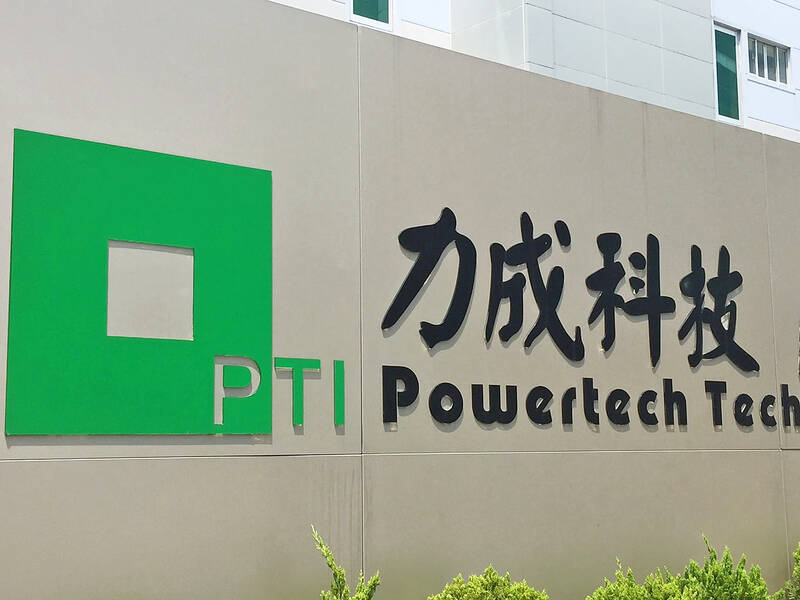Memorychip testing and packaging services provider Powertech Technology Inc (力成科技) expects revenue this year to grow at an annual single-digit percentage rate, driven primarily by robust demand for artificial intelligence (AI) devices and data centers this quarter.
The company is investing heavily in advanced packaging technologies including panel-level packaging and chip-on-wafer-on-substrate (CoWoS) technologies to further capture AI opportunities, and is in talks with customers to provide CoWoS solutions, CEO Boris Hsieh (謝永達) told an investors’ conference yesterday.
The company aims to provide a complete CoWoS solution rather than only providing the easier part of the back-end solution, he said.

Photo: Grace Hung, Taipei Times
AI applications accounted for 8 percent of the company’s revenue last quarter, rising from 6 percent in the second quarter and 4 percent in the first quarter.
This year’s growth momentum would also be fueled by the spillover effect of a high bandwidth memory (HBM) expansion, Hsieh said.
That means Powertech has a chance to receive more orders to provide standard DRAM chip testing and packaging services from the world’s three major memorychip makers, which have allocated significant capacity to produce HBM DRAM chips to support surging AI demand.
Revenue last year plummeted about 16 percent to NT$70.44 billion (US$2.19 billion) amid the global semiconductor industry’s worst slump in more than 20 years, it said.
“The total consolidated revenue can still grow by a single-digit percentage year-on-year this year in the absence of revenue from China’s Xian plant,” Hsieh said.
Powertech previously produced standard DRAM chips for Micron Technology Inc at the Xian plant based on a supply agreement, which expired in June.
As a result, Powertech’s revenue dropped 6.6 percent quarterly, and down 0.8 percent annually, to NT$18.3 billion last quarter.
Net profit fell 7 percent to NT$2.15 billion last quarter, from NT$2.31 billion the previous quarter, as the company posted nonoperating losses of NT$63 million in the quarter, mainly due to significant foreign exchange losses, it said.
On an annual basis, net profit rose 8 percent from NT$1.99 billion.
Gross margin improved to 21.4 percent last quarter from 19 percent in the previous quarter and 17.8 percent in the same period last year, the company said.
In the first three quarters, total net profit soared 27.5 percent annually to NT$6.57 billion, from NT$5.16 billion, while earnings per share rose to NT$7.05 from NT$5.41 and revenue increased 9.4 percent to NT$56.22 billion from NT$51.41 billion, it said.

When an apartment comes up for rent in Germany’s big cities, hundreds of prospective tenants often queue down the street to view it, but the acute shortage of affordable housing is getting scant attention ahead of today’s snap general election. “Housing is one of the main problems for people, but nobody talks about it, nobody takes it seriously,” said Andreas Ibel, president of Build Europe, an association representing housing developers. Migration and the sluggish economy top the list of voters’ concerns, but analysts say housing policy fails to break through as returns on investment take time to register, making the

‘SILVER LINING’: Although the news caused TSMC to fall on the local market, an analyst said that as tariffs are not set to go into effect until April, there is still time for negotiations US President Donald Trump on Tuesday said that he would likely impose tariffs on semiconductor, automobile and pharmaceutical imports of about 25 percent, with an announcement coming as soon as April 2 in a move that would represent a dramatic widening of the US leader’s trade war. “I probably will tell you that on April 2, but it’ll be in the neighborhood of 25 percent,” Trump told reporters at his Mar-a-Lago club when asked about his plan for auto tariffs. Asked about similar levies on pharmaceutical drugs and semiconductors, the president said that “it’ll be 25 percent and higher, and it’ll

CHIP BOOM: Revenue for the semiconductor industry is set to reach US$1 trillion by 2032, opening up opportunities for the chip pacakging and testing company, it said ASE Technology Holding Co (日月光投控), the world’s largest provider of outsourced semiconductor assembly and test (OSAT) services, yesterday launched a new advanced manufacturing facility in Penang, Malaysia, aiming to meet growing demand for emerging technologies such as generative artificial intelligence (AI) applications. The US$300 million facility is a critical step in expanding ASE’s global footprint, offering an alternative for customers from the US, Europe, Japan, South Korea and China to assemble and test chips outside of Taiwan amid efforts to diversify supply chains. The plant, the company’s fifth in Malaysia, is part of a strategic expansion plan that would more than triple

Taiwanese artificial intelligence (AI) server makers are expected to make major investments in Texas in May after US President Donald Trump’s first 100 days in office and amid his rising tariff threats, Taiwan Electrical and Electronic Manufacturers’ Association (TEEMA, 台灣電子電機公會) chairman Richard Lee (李詩欽) said yesterday. The association led a delegation of seven AI server manufacturers to Washington, as well as the US states of California, Texas and New Mexico, to discuss land and tax issues, as Taiwanese firms speed up their production plans in the US with many of them seeing Texas as their top option for investment, Lee said. The